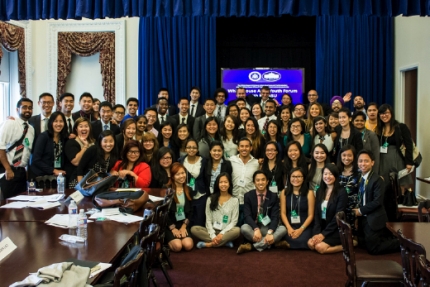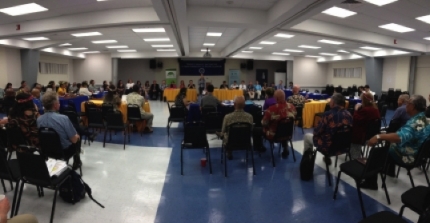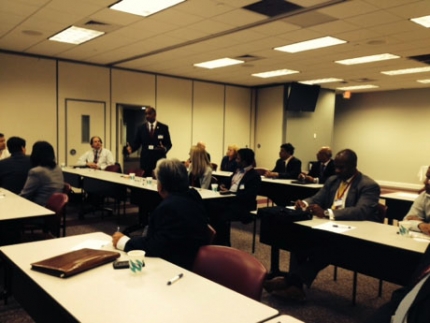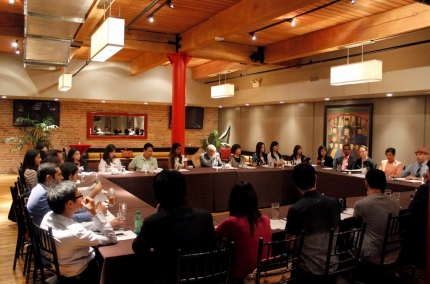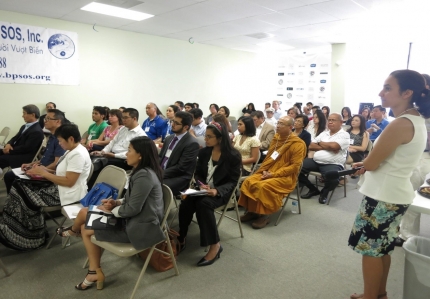Initiative on Asian Americans and Pacific Islanders Blog
WHIAAPI Announces Its 2014-2015 E3! Ambassadors
Posted by on September 18, 2014 at 1:48 PM ESTThe White House Initiative on Asian Americans and Pacific Islanders (WHIAAPI) is proud to announce its first class of E3! Ambassadors, 32 young leaders from across the nation committed to improving the quality of life and opportunity for young AAPIs.
Launched earlier this summer, the E3! Ambassadors Program aims to “Educate, Engage, and Empower” young leaders and to highlight key federal programs and resources in which AAPIs may be underserved. The selected E3! Ambassadors will conduct outreach within their campuses and communities from September 2014 to May 2015.
Learn more aboutAnnouncing New Partnerships to Expand Opportunity for AAPIs
Posted by on September 15, 2014 at 12:53 PM ESTEarlier this year, the White House Initiative on Asian Americans and Pacific Islanders (WHIAAPI) announced Challenge.gov partnership opportunities during our National AAPI Community Google+ Hangout. The Challenge invited individuals and organizations to submit their ideas for potential partnerships with the Initiative that would help improve the quality of life for Asian Americans and Pacific Islanders (AAPIs). We received many innovative proposals from across the country that addressed various issues affecting the AAPI community, from education to health to economic development.
The Initiative is excited to announce five partnerships that arose from the Challenge:
1) Filipino American Chambers Capacity Building Project
WHIAAPI is partnering with the Filipino American Chamber of Commerce of Philadelphia and New Jersey to design a “boot camp” for small business owners. This boot camp will feature both private-sector and federal agency partners to deliver training, technical assistance, and key resources for AAPI businesses. The effort will pilot a tailored and culturally specific approach to the AAPI business community that can hopefully be scaled to other regions across the country.
Learn more aboutIncreasing Opportunity and Access for Pacific Islanders
Posted by on September 12, 2014 at 8:30 AM ESTEarlier this year, the White House Initiative on Asian Americans and Pacific Islanders (WHIAAPI), in coordination with Payu-ta Inc. (an umbrella organization of non-governmental organizations in the Pacific region), held its first Community Tour and Regional Summit outside the contiguous U.S. at Guam Community College, where I serve as President and Chief Executive Officer. During this convening, community leaders shared stories of their respective struggles and challenges, while federal representatives highlighted programs and technical assistance to address the community’s needs.
We are proud to have convened 200 community leaders and 25 federal officials from agencies including the U.S. Environmental Protection Agency, Small Business Administration, and the Departments of Commerce, Education, Health and Human Services, Housing and Urban Development, Interior, Labor, and Veterans Affairs. Federal representatives heard community recommendations regarding next steps on topics such as housing, veterans issues, economic development, education, and health equity, and vowed to tackle those issues upon return to Washington, D.C. and their respective regional offices.
Learn more aboutChampioning America’s Small Businesses
Posted by on September 11, 2014 at 1:44 PM ESTIn August, I had the pleasure of working with the Virginia Asian Chamber of Commerce on a training course for small business owners on how they can compete for large supplier contracts. A unique aspect of this particular training event was that the training was geared toward Asian American-owned Small Businesses (SB). The course instructor provided guidance to the attendees on administrative and business approaches that best meet the large supplier requirements.
As I listened to the instruction, I reflected on broader impact of the effort and the words of Vice President Biden earlier this year during the Asian American and Pacific Islander Heritage Month Opening Ceremony. The Vice President remarked that “America’s success depends on the endless streams of enterprising immigrants coming to our nation, and the opportunities we provide to them.” This was clearly one of those opportunities.
Learn more aboutAsian American and Pacific Islander Enrollment in the Deferred Action for Childhood Arrivals (DACA) Program
Posted by on August 7, 2014 at 9:16 AM ESTOn June 15, 2012, the Secretary of Homeland Security announced the Deferred Action for Childhood Arrivals (DACA) process, which provides temporary relief from deportation and an opportunity to obtain work authorization to certain eligible undocumented individuals who came to the United States as children. With DACA status, individuals can potentially obtain a social security number, apply for a driver’s license, apply for scholarships and access additional opportunities in the workforce.
According to the latest report released by the U.S. Department of Homeland Security, South Korea, the Philippines, and India are included among the top 15 countries of origin for DACA applicants. As of January 2012, there were 310,000 unauthorized immigrants living in the United States from the Philippines, 260,000 from India, 230,000 from Korea, 210,000 from China and 160,000 from Vietnam. Still, the DACA enrollment rates of Asian Americans and Pacific Islanders (AAPIs) are disproportionately low; there are an estimated 108,024 potential DACA beneficiaries from Asia, many who have not applied for the DACA program.
That’s why the White House Initiative on Asian Americans and Pacific Islanders (WHIAAPI) recently worked with USCIS to host a series of roundtables to discuss challenges and best practices in effective DACA outreach to AAPI communities. These roundtables were held in Dayton, Ohio; Chicago, Illinois; and Houston, Texas, and led by members of the President’s Advisory Commission on AAPIs: Michael Byun, Kathy Ko Chin, Billy Dec and Linda Phan. Participants included leaders from the faith-based, education, social services, and business communities.
At each roundtable, WHIAAPI shared immigration updates from the Administration, and representatives from USCIS provided a comprehensive presentation on the DACA initial request and renewal processes. Dialogue was focused on mitigating fear and community stigma precluding undocumented immigrants from Asian countries from requesting DACA; providing input into efforts to translate DACA materials into Asian languages; and ensuring DACA-eligible undocumented immigrants from Asian countries and their families have access to assistance from non-governmental service providers during the process.
WHIAAPI, USCIS, and community participants agreed to continue to work to find ways to tailor DACA outreach to address the needs, interests and aspirations of the diverse immigrant community from Asian countries.
DACA remains a good legal option available to young individuals who immigrated to the United States with no legal status. Learn more about how to apply or renew.
Tuyet Duong is Senior Advisor at the White House Initiative on Asian Americans and Pacific Islanders.
A Time for Your Voices to Be Heard
Posted by on August 6, 2014 at 11:55 AM ESTOver the course of the past several years, members of the Native Hawaiian community, Hawaii’s congressional delegation, and state leaders have requested that the U.S. Department of the Interior (DOI) consider ways to further formalize the relationship between the United States and the Native Hawaiian community.
As a result of these requests, in June of this year, DOI released an Advanced Notice of Proposed Rulemaking (ANPRM). DOI, through the ANPRM, is seeking public input on whether it should propose an administrative rule that would facilitate the reestablishment of a government-to-government relationship between the United States and the Native Hawaiian community. The ANPRM provides for an extensive series of public meetings and consultations to solicit comments that could help determine whether the Department develops a formal, administrative procedure for reestablishing such a relationship, and if so, what that procedure should be.
Learn more about Additional Issues
- &lsaquo previous
- …
- 8
- 9
- 10
- 11
- 12
- 13
- 14
- 15
- 16
- …
- next &rsaquo
White House Blogs
- The White House Blog
- Middle Class Task Force
- Council of Economic Advisers
- Council on Environmental Quality
- Council on Women and Girls
- Office of Intergovernmental Affairs
- Office of Management and Budget
- Office of Public Engagement
- Office of Science & Tech Policy
- Office of Urban Affairs
- Open Government
- Faith and Neighborhood Partnerships
- Social Innovation and Civic Participation
- US Trade Representative
- Office National Drug Control Policy
categories
- AIDS Policy
- Alaska
- Blueprint for an America Built to Last
- Budget
- Civil Rights
- Defense
- Disabilities
- Economy
- Education
- Energy and Environment
- Equal Pay
- Ethics
- Faith Based
- Fiscal Responsibility
- Foreign Policy
- Grab Bag
- Health Care
- Homeland Security
- Immigration
- Innovation Fellows
- Inside the White House
- Middle Class Security
- Open Government
- Poverty
- Rural
- Seniors and Social Security
- Service
- Social Innovation
- State of the Union
- Taxes
- Technology
- Urban Policy
- Veterans
- Violence Prevention
- White House Internships
- Women
- Working Families
- Additional Issues
